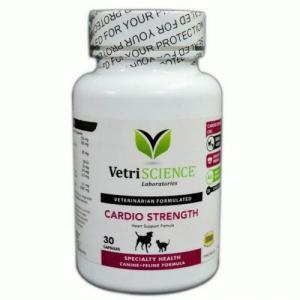Table of Contents
Just like humans, pets can also experience various heart-related issues that can impact their quality of life. Cardiovascular support supplements are designed to provide a range of benefits that contribute to optimal cardiovascular function. They can help support the structure and function of the heart muscle, ensuring that it operates efficiently. Cardio support supplements can enhance blood flow, vital for maintaining healthy organ function and overall vitality. Cardio supplements help maintain the electrolyte balance necessary for regular heartbeats and normal blood pressure. They can address various risk factors contributing to pet heart issues, such as inflammation, poor circulation, and irregular heartbeats.
As pets age, their risk of developing heart-related issues increases. Cardio support supplements can benefit older pets by giving them the nutrients they need to maintain a healthy heart as they age. When the heart functions optimally, pets are more likely to have better energy levels, enhanced mobility, and improved quality of life.

What is Cardio Strength (L-Carnitine, L-Taurine, folic Acid, Magnesium, Potassium, Selenium), 1mg?
Cardio Strength is a specially crafted supplement that provides robust cardiovascular support for dogs and cats. This unique formula combines a synergistic blend of 11 natural and effective ingredients to promote optimal heart health in your beloved pets.
Ingredients
Each capsule contains active ingredients in the following amounts:
- L-Carnitine HCl – 250 mg;
- L-Taurine – 250 mg;
- N, N-Dimethylglycine HCl – 50 mg;
- D-Alpha Tocopheryl Succinate (Vitamin E) – 30 mg;
- Eicosapentaenoic Acid (EPA) Powder Blend – 25 mg;
- Coenzyme Q10 – 20 mg;
- Gamma Linolenic Acid (GLA) Powder Blend – 10 mg;
- Folic Acid – 0.9 mg;
- Magnesium (as Magnesium Citrate/Malate) – 0.5 mg;
- Potassium (as Potassium Citrate/Malate) – 0.1 mg;
- Selenium (as Sodium Selenite) – 0.007 mg.
Inactive Ingredients
- Rice Flour;
- Titanium Dioxide (Color);
- Vegetable Cellulose;
- Vegetable Stearate.
Benefits of Ingredients
- L-Taurine: Supports a regular heartbeat, aids in maintaining potassium levels, and facilitates proper electrolyte utilization.
- Potassium: Essential for maintaining balanced electrolytes, contributing to normal heartbeat and blood pressure.
- N, N-Dimethylglycine (DMG): Acts as an antioxidant, supporting circulation and immune system health.
- Coenzyme Q10: Enhances heart tissue oxygenation and strengthens heart muscles.
- L-Carnitine: Aids in using fat for energy and oxygen utilization, promoting fat metabolism, and helping balance triglyceride and cholesterol levels. This helps with energy production and contributes to healthy metabolism and overall fitness. L-Carnitine has been shown to help balance triglyceride and cholesterol levels, which is important for heart health.
- EPA and GLA (Fatty Acids): Support circulation and blood flow for improved cardiovascular function.
- Vitamin E: Supports healthy clotting and maintains capillary strength, promoting overall heart health.
Dosage Sizes
|
Pet |
Dosage |
Frequency |
|
Cats |
1 capsule |
Daily |
|
Dogs |
1 capsule per 30 lbs of body weight (If giving more than 1 capsule, divide between AM and PM) |
Daily |
Important Safety Information for Pet Owners
Before starting any new supplement regimen for your pet, it’s crucial to consult your veterinarian. Always follow the recommended dosage instructions provided by the manufacturer or your veterinarian. Dosages are typically based on the size and weight of your pet, so ensure accurate measurements.
Check the supplement’s ingredients list for any components your pet may be allergic to. Avoid using the supplement if your pet has a known ingredient allergy. While using the supplement, closely monitor your pet’s health and behavior. If you notice any adverse reactions, discontinue use immediately and consult your veterinarian.
Safe use in pregnant animals or those intended for breeding has not been established. Consult your veterinarian if your pet’s condition does not improve.
This product is intended for animal use only. Keep out of reach of both children and animals. In case of accidental overdose, seek immediate medical attention.
Start with a smaller dose to gauge your pet’s tolerance when introducing a new supplement. Gradually increase the dosage as recommended, if necessary.
Cardio support supplements should complement, not replace, regular veterinary care. Continue to schedule routine check-ups to monitor your pet’s overall health.
While cardio support supplements can offer benefits, they should be used with a balanced diet, regular exercise, and proper veterinary care. Your veterinarian’s guidance is essential to ensure the well-being of your furry companion.
Veterinary Prescription
In many cases, cardio support supplements for pets are available over the counter and do not require a veterinary prescription. These supplements are often considered nutritional supplements rather than medications, and they are typically formulated with natural ingredients that are generally recognized as safe.
Even if a supplement does not require a prescription, it’s strongly recommended to consult your veterinarian before introducing any new supplement into your pet’s routine. Additionally, your veterinarian’s input is especially important if your pet has any existing health conditions, is on medications, is pregnant, or is nursing. They can help you decide about supplements and ensure they won’t interfere with ongoing treatments.
Interaction
Interactions with cardio support supplements can occur when the supplements interact with other medications, supplements, or your pet’s health conditions. While many cardio support supplements are formulated with natural ingredients and are generally safe, it’s essential to consider the potential for interactions, especially if your pet is taking other medications or has underlying health issues. Here are some points to consider regarding interactions with cardio support supplements:
- Medication Interactions: Some supplements can interact with the medications your pet is taking. For example, if your pet is on medications for heart conditions, blood pressure regulation, or other health issues, certain supplement ingredients might affect the way these medications work. Always inform your veterinarian about all the medications your pet is taking, including supplements.
- Blood-Thinning Medications: Supplements like fish oil, which may contain omega-3 fatty acids, can have a mild blood-thinning effect. If your pet is on blood-thinning medications, consult your veterinarian before adding such supplements to their regimen.
- Antioxidant Supplements: Cardio support supplements often contain antioxidants like Vitamin E or Coenzyme Q10. While antioxidants are generally beneficial, high doses might interact with certain medications or health conditions. Your veterinarian can guide you on the appropriate dosage to avoid potential interactions.
- Electrolyte Balance: Some supplements contain electrolytes like potassium. If your pet is already on medications that affect electrolyte levels or has kidney issues, the additional intake of these electrolytes from supplements might lead to imbalances.
- Health Conditions: If your pet has underlying health conditions, such as kidney or liver disease, diabetes, or allergies, certain supplement ingredients could exacerbate or interact with treatments. Always consult your veterinarian before introducing new supplements.
- Individual Sensitivities: Like humans, pets can have individual sensitivities to certain ingredients. When introducing a new supplement, watch for any signs of allergic reactions or adverse effects.
To ensure the safety and well-being of your pet, consult your veterinarian before adding any new supplement to your pet’s diet, especially if they are on any medications or have pre-existing health conditions.
Side Effects
Cardio support supplements for pets are generally formulated to be safe and well-tolerated. Still, as with any supplement, side effects are possible, especially if the supplement is not used appropriately or if your pet has sensitivities to certain ingredients. It’s important to be aware of potential side effects and monitor your pet’s response when introducing any new supplement. Here are some potential side effects to watch for:
- Gastrointestinal Upset: When starting a new supplement, some pets might experience mild gastrointestinal upset, such as vomiting or diarrhea. This is often a transient reaction as their digestive system adjusts to the new ingredients.
- Allergic Reactions: Like with food allergies, some pets might be sensitive to specific ingredients in the supplement, leading to allergic reactions like itching, skin rashes, or hives.
- Blood-Thinning Effect: Supplements containing omega-3 fatty acids (EPA and DHA) can have a mild blood-thinning effect. If your pet is prone to bleeding disorders or is on blood-thinning medications, excessive intake of these supplements might be problematic.
- Electrolyte Imbalances: Supplements containing electrolytes like potassium can disrupt electrolyte balance if not dosed correctly. This can lead to issues such as irregular heartbeat, muscle weakness, or other symptoms related to electrolyte imbalance.
- Interaction with Medications: Some supplements can interact with medications your pet is already taking, affecting their efficacy or causing unexpected side effects. It’s essential to consult your veterinarian before introducing new supplements, especially if your pet is on medications.
- Excessive Dosage: Giving your pet too much of a supplement, even a safe one, can lead to adverse effects. Always follow the recommended dosage instructions and consult your veterinarian if you’re unsure about the appropriate dose.
- Pre-existing Conditions: If your pet has underlying health conditions such as kidney disease, liver issues, or heart problems, certain supplement ingredients might exacerbate these conditions or interact with treatments.
- Individual Sensitivities: Like humans, pets can have individual sensitivities to certain ingredients. Pay attention to any unusual behavior, appetite, or overall well-being changes.
Most side effects are usually mild and temporary. If you observe any adverse reactions, discontinue the supplement and contact your veterinarian for guidance.
Overdose
While cardio support supplements for pets are generally designed to be safe when used as directed, an overdose can still occur if the recommended dosage is exceeded. It’s essential to be cautious and follow the manufacturer’s or your veterinarian’s dosing instructions.
Overdosing on cardio support supplements can lead to adverse reactions. These reactions can vary depending on the supplement’s ingredients and the specific dosage. Common adverse effects might include gastrointestinal upset, vomiting, diarrhea, lethargy, and even more severe symptoms in extreme cases.
Some cardio support supplements contain electrolytes like potassium and magnesium. Excessive intake of these electrolytes can disrupt the balance of minerals in the body, leading to irregular heartbeats, muscle weakness, and other related symptoms.
Supplements containing omega-3 fatty acids (EPA and DHA) can have a mild blood-thinning effect. An overdose might increase the risk of bleeding or interfere with blood clotting.
If your pet is on medications, an overdose of supplements can potentially interact with these medications, affecting their efficacy or causing unintended side effects.
Some pets might be more sensitive to certain supplement ingredients than others. An overdose could exacerbate individual sensitivities and lead to allergic reactions or other adverse effects.
Excessive intake of certain nutrients, vitamins, or minerals can strain the liver, kidneys, or other organs responsible for processing and excreting these substances. This can lead to organ dysfunction or damage.
To prevent an overdose:
- Stick to the recommended dosage instructions provided by the manufacturer or your veterinarian. If you need more clarification about the appropriate dose, consult your veterinarian.
- Before introducing any new supplement, consult your veterinarian. They can recommend the appropriate dosage based on your pet’s health needs.
- Pay attention to your pet’s behavior, appetite, and overall well-being while using supplements. If you notice any unusual symptoms, discontinue the supplement and contact your veterinarian.
- Keep supplements out of your pet’s reach and stored securely to prevent accidental ingestion.
Contact your veterinarian or an emergency veterinary clinic immediately in case of accidental overdose. They can guide the appropriate steps to take based on the specific supplement and your pet’s condition.
Storage
Incorrect storage can lead to degradation of the supplement’s ingredients and potentially cause them to become less potent or even harmful. Here are some guidelines for storing cardio supplements:
Store supplements in a cool, dry place away from direct sunlight, heat sources, and moisture. Excessive heat and humidity can degrade the ingredients and reduce the supplement’s efficacy.
Make sure the supplement container is appropriately sealed after each use. Oxygen and moisture can lead to the breakdown of active ingredients over time. Keep the supplement in its original container with the label intact. This helps you keep track of the product’s expiration date and usage instructions.
Store supplements in a location that is inaccessible to your pets and children. Some supplements might be tempting to pets due to their smell or taste.
While cool temperatures are beneficial, freezing can negatively affect the stability of the supplement’s ingredients. Avoid storing supplements in the freezer.
Store supplements away from household cleaning products, chemicals, and strong odors that could affect their quality.
If you notice any changes in the supplement’s appearance, smell, or consistency, or if the expiration date has passed, it’s best to dispose of the supplement and acquire a fresh supply.

































